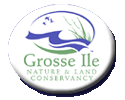

Vol. 17 No. 1
In this issue...
Landscaping at Centennial Farm
2008 GI Conservationist of the Year Award
Membership Renewals
Memorials & Honorariums
Upcoming Events...
April 26
Earth Day
1PM to 4PM
Centennial Farm
May 2
GINLC Clean Up
Meet 9AM
Centennial Farm
May 9
Intrepid Pond Planting
Come when you can 9AM to 3PM
Meet at Meridian and Intrepid
Date to be announced
Fall Property Tour
November 7
Annual Meeting
10AM to 11:30AM
Centennial Farm
Recycling
by Carrie Harvan, GIHS Journalism Student
According to Earth911.com recycling is the process of taking a product at the end of its life and using all or part of it to make another product. The Environmental Protection Agency estimates that 75% of our waste is recyclable, but only about 25% ends up in recycling bins at home or school. There is so much information available on how to reduce, reuse and recycle that it can often be confusing how to help make the earth a cleaner, more beautiful place to live.
Recycling has two main goals: keeping reusable materials out of landfills and making sure that hazardous materials and chemicals are disposed of properly. Recycling can benefit the environment by conserving the use of resources, space in landfills and energy. Plastic bottles are made out of the same oil that makes gasoline. By recycling plastic bottles you can save the earth from the chemical emissions made during the production of more plastic bottles. Environment-green.com claims that for every one ton of plastic bottles recycled we can save the equivalent of 2 people’s energy use for one year, the amount of water used by one person in two months and almost 2000 pounds of oil. With this kind of benefit, recycling should be a priority for everyone.
One reason why people don’t recycle as much as they can is they might not know just how much can be recycled. So just what can be recycled and where?
A few commonly recycled materials are plastic bags, aluminum cans, glass, waxed cartons, paper and batteries. Most of these products can be recycled through curbside recycling programs and paper, plastic bottles and aluminum cans can be recycled in the bins in each classroom at school. Batteries can be returned to the Grosse Ile Hardware.
Less commonly recycled materials are cell phones, computers, old refrigerators, disposable cameras, glasses and florescent light bulbs. These products can be brought to drop off centers throughout the country where they can be recycled and used to make other products or in the case of old cell phones and glasses, they can be donated. Habitat for Humanity and other groups will take refrigerators and similar household appliances. The Department for Public Safety also accepts clean foam products like packing chips.
As a fundraiser, the Grosse Ile High School Science Club recycles paper products. The large recycling bin in the High School parking lot is open to the public. All the money received through the recycling program will be added to the Science Club to fund their activities.
Not only does recycling benefit the environment and your local high school, but it can benefit your wallet. You can receive the deposit on your plastic bottles and aluminum cans by returning them to your local grocery store.
